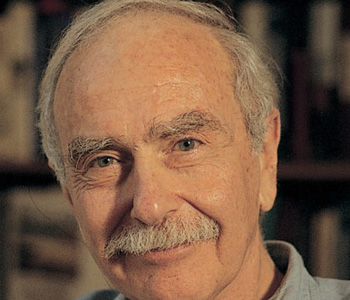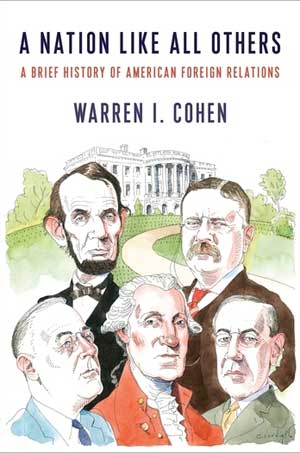
A Nation Like All Others is a history of American foreign relations from 1776 to the present; it also a critique of the idea of American exceptionalism; and it laments the absence of moral imagination in most of the nation’s leaders. It begins with a description of the origins of empire in the 18th and 19th century, as Americans drove Native Americans out of their lands, just as ancient Chinese overwhelmed their weaker neighbors in the creation of the Chinese Empire thousands of years before. In the course of reviewing the subsequent history of American relations with the rest of the world, I describe the United States as a frequent force for good—more so than any other nation—but demonstrate with regret the evil committed—against Native Americans, Mexicans, Filipinos, Vietnamese, Iraqis, and others—as our leaders gave priority to their concerns for the national interest over American ideals. Therein lies my conception of “a nation like all others.” I did not think that way when I enlisted in the U.S. Navy 62 years ago.
Readers, much like reviewers for the Press, will find many of my interpretations “argumentative.” I trust that will stimulate some fresh thinking about some of the actions (or inactions) I analyze. My rejection of the idea of American isolationism in the 1920s, my description of the enormously important role the United States played in world affairs from the end of World War I to the onset of the Great Depression, will probably surprise some, but my work on that subject has gained acceptance over the years among most professional diplomatic historians. My discussion of the Cold War is unavoidably long, but a bit more sympathetic to Ronald Reagan than some of my earlier books. I continue to see Mikhail Gorbachev as the key figure in ending the Soviet-American confrontation. My analysis of current Chinese-American relations, critical of those who imagined the emergence of a friendly democratic China, reflects the principal focus of my life’s research, writing, and activities.
I have spent my entire adult life studying and writing about the United States in world affairs. Much of my work, especially the essays, but also many of the books, were written for other historians and perhaps graduate students. But, I always felt the need to write for a larger audience. Many years ago, the late Barbara Tuchman, a wonderful popular historian, wrote to compliment me on a review I wrote savaging an absurd biography of General George Marshall authored by a popular biographer. She noted, however, that books like that one, would always win public attention so long as professional historians wrote primarily for each other. I never forgot her admonition, and several of my books, especially my America’s Response to China , were written for undergraduates and the general public. This book falls into that category. I left out the footnotes and bibliography, the usual apparatus of scholarship, noting where the interested reader could find them (see George Herring’s From Colony to Superpower or the New Cambridge History of American Foreign Relations for which I was the general editor—both over 1,000 pages).
I have always enjoyed taking long and complicated arguments and cutting them down to size and removing unnecessary complications. Some years ago, I wrote East Asia at the Center: Four Thousand Years of Engagement with the World in less than 500 pages. I imagined I could write a history of American foreign relations in 200 pages. I failed: this book runs 299 pages.
For those whose eyes are caught by the book’s cover, I would urge them to read the preface (2 pages) and “Last Thoughts” (5 pages). Those few pages will tell the reader all they need to know about me, why I wrote the book, and what I thought as I finished revising it in March 2017. They might also enjoy the first chapter (5 pages) that offers an interpretation of the causes of the American revolution that is a bit different than the story as usually remembered.
Many who teach American history at the college and high school levels are sorely misinformed about the history of America’s foreign affairs; victims of survey texts reflecting little or no awareness of the scholarship of diplomatic historians and historians of international affairs over the last 50 years or so. Few have the time read to widely outside of their own specialties. I hope the arguments in this easily accessible brief but comprehensive history will capture their attention and stimulate some new thinking.
And, like all Americans, I would hope our current and future leaders will make the United States a force for good in the world, leave the world a better place for our children. Perhaps in common with all other historians, I imagine our country will have a better shot at success if we had a clearer sense of what we did well and where we failed in years past. I hope this book contributes to that end.


Warren I. Cohen is University Distinguished Professor Emeritus at Michigan State University and the University of Maryland, Baltimore County, and a Senior Scholar in the Asia Program of the Woodrow Wilson Center. He has written thirteen books and edited eight others. He served as a line officer in the U.S. Pacific Fleet, editor of Diplomatic History, President of the Society for Historians of American Foreign Relations, and chairman of the Department of State Advisory Committee on Historical Diplomatic Documentation. In addition to scholarly publications, he has written for the Atlantic, Baltimore Sun, Christian Science Monitor, Dissent, Foreign Affairs, International Herald Tribune, Los Angeles Times, The Nation, New York Times, Times Literary Supplement, and the Washington Post. He has also been a consultant on Chinese affairs to various government organizations.